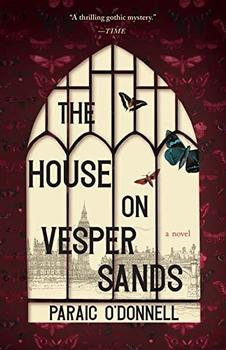Summary | Excerpt | Reading Guide | Reviews | Beyond the Book | Readalikes | Genres & Themes | Author Bio

"You are paler even than usual, Miss Tull. I trust you are not unwell?"
Esther drew in a careful breath. "I am quite well, Mr. Carew."
"Well, then," he said. "You must give me your guess as to its price. You do not mean to tell me that you are a woman who does not know the price of things?"
He did not disguise his smirk. She had lived honestly for many years, but it had not always been so. It was useful to them—to Lord Strythe and his underlings—to keep her in mind of what they knew.
"I cannot imagine what the price of it might be, Mr. Carew. I am no judge of such things."
His features lapsed in dissatisfaction. "Miss Tull," he said. "Permit yourself one guess, if you please."
Esther drew her shoulders back and let out a long breath. "Ten pounds," she said.
Mr. Carew arched away from her as if in horror, bringing the back of his hand to his brow. "Oh, Miss Tull," he said. "Ten? Ten pounds? Is that a great sum, do you think?"
He looked away, shaking with voiceless laughter.
"Ten pounds, she says, for a bird that is very nearly a cousin to the phoenix? For a bird that might have taken wing from the ashes of a fire? Why, it is very nearly priceless, but such is His Lordship's generosity that he intends to offer it for auction at the gala. The proceeds are to go to his new institution." When Esther made no reply, he grew stern again and repeated himself. "Such is his generosity, Miss Tull."
She could not bring herself to respond, only lowering her head in a manner that might appear deferential. She sensed that he was not entirely satisfied by this, but he was distracted at that moment by the appearance of a serving boy. He was a slight youth of thirteen or fourteen—Esther had seen him on other occasions—and encumbered by a mass of white flowers very nearly half his own size.
"Begging your pardon, Mr. Carew," he said. "I was to give you word, you said, when the arrangement come in."
"Go and stand them in water, you mongrel, before the carpet is ruined. The dust from the lilies is a curse. Has the instrument maker come?"
"No sign yet, sir."
"Be sure to tell me when he does. There are instructions from His Lordship. Get along with you now." Carew produced a plump pocket watch and clucked at it in disapproval. "Come, Miss Tull," he said, as if the delay had been of her making. "We haven't the whole night to stand around gawking."
The workroom was on the fourth floor. Mr. Carew was not sprightly, and he made slow going of the climb. At each landing he paused to fuss over some small task—to rub at some invisible smear or inspect the wick of a lamp—until he had recovered his breath. Esther had often chafed at having to keep to his pace. She knew the way well enough, and might have made the ascent alone in half the time, had the circumstances been otherwise. But she was glad tonight to remain unheeded at his back, and to be spared any greater exertion. The climb had disturbed the wounds. She was conscious now of a rupturing, of a seeping heat. Some sound might escape her, if it worsened. Something might show.
Mr. Carew lumbered onwards, giving no sign that he had taken notice, and she saw nothing else that seemed out of the ordinary. A footman stood aside as they approached, a cloak of freshly brushed velvet draped over one arm. Behind certain doors, when they passed, subdued conversations could be heard, or the muted clamour of servants at some obscure but pressing business. In this house, a great deal happened that went unseen.
It was furnished handsomely enough, but sparingly lit. Lord Strythe was known to dislike the gaslights that were now seen in many fine houses, and many rooms had no more than a scattering of oil lamps. They burned less brightly, he maintained, but with a purer light. The drapes and wallpapers were in sombre shades, or they had aged to give that appearance. They had been chosen in the time of the last Lord Strythe, and his son had given them no further attention. His Lordship had never married, and in the ordinary course the ordering of such things might have fallen to his sister. But Lady Ada did not live at Strythe House. Her opinion in these matters was not sought.
Excerpted from The House on Vesper Sands by Paraic O'Donnell. Copyright © 2021 by Paraic O'Donnell. Used with the permission of the publisher, Tin House. Copyright © 2020 by Paraic O'Donnell.




There is no worse robber than a bad book.
Click Here to find out who said this, as well as discovering other famous literary quotes!
Your guide toexceptional books
BookBrowse seeks out and recommends the best in contemporary fiction and nonfiction—books that not only engage and entertain but also deepen our understanding of ourselves and the world around us.